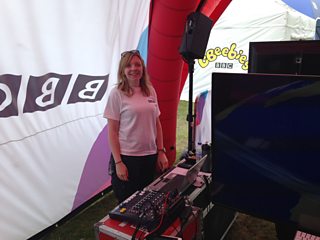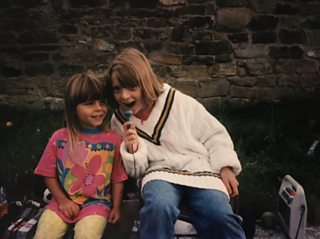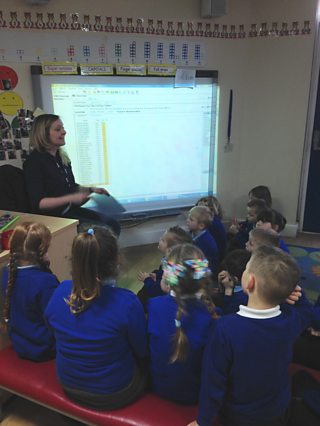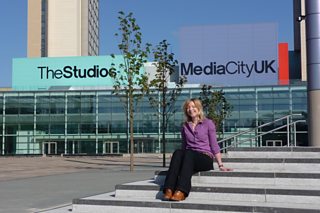Inspiring the next generation
Angela Stevenson
Senior Technologist, Βι¶ΉΤΌΕΔ Design & Engineering
For International Women's Day, broadcast engineer Angela Stevenson describes some of the inspirations she had for her career and how she tries to encourage school children in a similar way.
“When did you know you wanted to be a Broadcast Engineer?” is the question asked most often by school students in the STEM sessions I undertake. These young people are looking for the clues in their own life which will determine a career choice. It is a huge honour to be trusted to help young people answer their own career questions and I remember vividly finding my own answers. When I was in secondary school the Βι¶ΉΤΌΕΔ brought an exhibition of its technologies to a sports hall in Newcastle. My family went to the exhibition and I met Βι¶ΉΤΌΕΔ engineers who showed their future predictions of media, video on demand, decades before iPlayer came into being. This event made a significant impression. In the earliest days of personal computing and dial up modems I understood the impact the internet was going to have on media and instantly I wanted to be part of it.

Angela on location for a roadshow
It was many years later I realised my youthful path to career answers came in three stages. In preparation for a STEM event I asked my parents when they knew I’d be an engineer. Their answer; “always, probably from being a toddler, definitely many years before the Βι¶ΉΤΌΕΔ exhibition visited”. My personality arrived young, from asking Father Christmas for hi-fi separates to always carrying a children’s encyclopaedia. Looking back I have no recollection of knowing society projected stereotypes onto little girls. Certainly I was protected from the thoughts of a small minority of adults but I didn’t see myself as different to other children. My sister had a doll, I made a house for it. My best friend had a toy robot, it was the central participant of all games.
The third piece of the puzzle fell into place on my first visit to a drama summer club. The older children had a radio station. Already being an expert at editing the Radio 1 Top 40 on a twin cassette deck, I couldn’t wait to join. I can recall in technicolour the day my membership was arranged. During a visit to the ‘studio’, really repurposed theatre sound equipment, I knew I’d found the place I could be something that felt incredibly important even before I had the words to describe it.

Angela tries her hand at cricket commentary at an early age
I realise this certainty is rare and of little use to young people I work with today, but as an adult being able to understand a process which was unconscious at the time helps in determining the answers students need. I introduce engineering as one example of a career choice that some might make, with the variety of roles and industries to which it is important, but maintain that finding a career they each love is my hope for their future. The real detail of how I came to be an engineer is important in answering the other question I am often asked…
What is it like to be a female engineer? is a question only asked by adults and for many years one I was unequipped to answer. My work in schools is hugely influenced by the first time I was asked this question. I was a teenager working on live sound with engineers I hoped were willing to work with me despite my youth and inexperience. A woman approached my colleagues to express delight at seeing a female engineer. In that moment I feared my dream would no longer come true as those I wanted to work with would see me differently and have reason not to believe in my ability. When I first visited schools I was disappointed to experience this again in the way teachers presented me to their students. I now brief schools to present me as an engineer they are unsurprised to see in order that students consider my career a realistic prospect for themselves. I support mixed group activities as the opinions of future male engineers are equally crucial to change. They too need to see me as an engineer who achieved what they should expect possible of all their classmates. What is rare in one generation we must ensure is commonplace in the next.

Inspiring the next generation
To this day I find the gender question a complicated one to answer without applying stereotypes I don’t identify with to myself and other women. I support all efforts to improve equality while wanting us to strive for more. I aim to conduct myself now in a way my younger self would have found supportive, not patronising or alienating among her peers. As someone who fully expected to enter an engineering career alongside many female peers I cannot deny that the low rate of women in engineering, currently at 9%, has opened my eyes to a reality I didn’t foresee.. Examining my own path into a life society did not expect of me has brought into focus many things about myself, my interests and my abilities which have proved a valuable steer. I think there are three core components to creating equality; recruit, retain and represent.
To recruit we must ensure everyone knows a career in engineering is a possibility and that as an employer we welcome their application. In this area I am very reassured that the Βι¶ΉΤΌΕΔ takes unconscious bias and recruitment without gender identification incredibly seriously. My role, and one I share with all engineering colleagues, is to ensure as many people as possible know engineering is a realistic prospect through outreach engagements and mentoring. Only then can equality in the workplace emerge.

To achieve representation I face my discomfort in speaking publicly to try to be a visible presence at industry events. Each professional can only commit a small amount of time to networking and public presentation of our work. I try to use my presence to stand up in the spaces where male colleagues gauge the landscape of our profession in the hope I can influence the beliefs of the whole industry. I was encouraged in my beliefs by an engineer I admire hugely who brought to my attention the nature of engineering as one of self-doubt. We are always teaching ourselves so the world can benefit from what we learn, always seeking answers to new questions and changing our capabilities as the science and technology changes around us. This poses a unique retention question, how can one person keep pace with colleagues during a year away from a field which changes daily? How can one return to a role that is unrecognisable from when it was last occupied? I hope the Βι¶ΉΤΌΕΔ can lead in new approaches to ensure valuable engineering skills can be retained despite whatever challenges life may present.
On each International Women’s Day we celebrate the efforts of those who have striven for change to give future generations situations they expect no less of. Each year I hope the number of young women wanting to become engineers not only increases but also that we get to a state where we can’t believe it was ever different. I hope all engineers join me in this commitment and through changing our industry we all gain greater understanding of ourselves and the vocations we are passionate about.
What is it like to be an engineer? I wouldn’t have it any other way.
